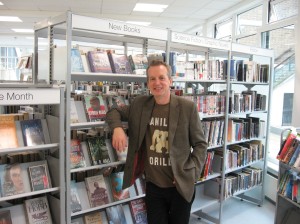It's not all bad news and problems in the world of the echo chamber, sometimes things work out really well. One such success story had escaped my notice until today (apologies if you already know about this and it's old hat). Frank Skinner is a comedian and broadcaster. He wrote an article for the Times entitled Sorry, the demise of the library is well overdue. I am militantly anti-the-Murdoch-empire, and the article is behind the Times paywall, so I don't want to encourage anyone to give any funds to the evil cabal (who knows, they may well find their way into Fox News's coffers) - so why not read this response to the article, in the Guardian, instead? Anyhow, the response in the library community was typified by Phil Bradley's piece - sniffy of Skinner's worth as a cultural commentator and dismissive of his views. I can understand that. My personal reaction was different, however - I really like Frank Skinner,and I listen to his Absolute Radio show (in podcast form) every week. Moreover, I know from having read both his books that he is a: extremely intelligent (I think people assume his qualifications are honourary ones bestowed on a famous person - but no, he did an MA in English Literature, he used to be a teacher, and his is very articulate) and b: a really, really good writer.
Like Seth Godin's before him, Frank's piece was worrying for two reasons - firstly the factual inaccuracies (he said books probably carry diseases - this is a column to order in the Times, remember..) and secondly the fact that his views were probably representative of many (libraries have no role in the modern world). It's not enough just to say he's wrong (which, regardless of my personal appreciation for him, I can see that he was) - we have to address the fact that he speaks for a lot of people.
I tried to do something about it, as an advocate of the #echolib approach to responding to attacks on libraries (ie don't just talk to other librarians about how awful it is). My efforts were, admittedly, pretty lame, but I tried. I emailed Frank via the radio show and explained that his views of libraries were one-dimensional and out-of-touch with reality. I provided an analogy with people's views of him - because he did laddish comedy in the 90s and wrote Three Lions, many people think he is a lad with only blokey, basic humour to offer. He can do that, but he's got a lot more to him than many give him credit for. That, I said, is like libraries - we're known for books, and we DO do books, but we also do a lot more than the causal observer would realise. With that parallel in mind, I said in the email, perhaps you could visit a library this week, see what they're really like, and talk about it on air?
Anyhow, no doubt the show's producers weeded out the email long before it ever reached Frank Skinner, as it's hardly primte-time Saturday morning entertainment fare to read out on air. Elsewhere in the library world, someone did something a lot better - someone wrote Frank a letter. There's some details here - a Westminster resident called Don Mackenzie wrote to Frank, explained why he thought Frank's views on libraries were misinformed, and then invited him to Church Street Library to see for himself. And Frank accepted! This isn't even a librarian taking action, it's a library-user - library champions really are worth their weight in gold.
The best bit of this story is what happens next. Frank Skinner wrote another piece about libraries for the Times, this time entitled: Why I’m on a new page with local libraries – it was my ideas that were dog-eared, not the places themselves. #WIN! In the piece, Skinner describes his fears about accepting the invitation because he was worried he'd be proved wrong, and then his eagerness to actually BE proved wrong when he reached the library. He goes on to basically be converted to the cause. Here's a quote:
The library had loads of computers. The general feel of the place was a cross between a clean, efficient secondary school and a cybercafé. No one was whispering. With the staff’s encouragement, I actually joined the library, and proceeded to choose a book. I wanted Tony Blair’s memoirs but that had already been stolen so I opted to reread Nineteen Eighty-Four. At last, George Orwell fans can reclaim the Big Brother franchise.
The smiling lady on the front desk pointed towards a machine on the wall. I put my newly issued card in a slot, scanned the book and got a slip showing the return date, which doubled as a perfect bookmark. I’m already seeing that date as a target. I work better with a deadline. Incidentally, I can return the book to any library in the borough and, you guessed it, renew it online.
I'd urge you to read the whole thing - and you can, because he's put the whole thing on his website. Yes that's right, it's not exclusively behind the Times paywall. The original piece was, mind you, but the retraction was not. How cool is that? Not only has this achieved the key echo chamber escape (that eluded us with Godin, Newsnight, KPMG et al) of the same audience reading the good stuff about libraries which originally read the bad stuff, but a BIGGER audience has read the good stuff because Skinner thought it important enough to put in the News section of his own web-page. Not only that, but I think a converted library skeptic is actually better news for the profession, overall, than if he'd never written the original article!
I really can't tell you how happy this whole thing has made me. :) Skinner has justified my faith in him, libraries have enjoyed a positive media narrative because of the whole incident, and many of our strategies for escaping the echo chamber have been shown to work wonderfully well!
w000000000t! That's all I can say. This also relates to the point that I keep harping on about whenever I'm given a platform - all we need to do is ensure that people can make an informed decision as to whether or not to use their libary. Not everyone needs libraries, that's fine. As long as people know what we do and can make up their own mind. Frank Skinner's opinion was based on a lack of understanding of modern libraries - when he obtained that understanding, his opinion changed. We need to do this, again and again, with everyone.
The Echo Chamber problem IS one we can all solve!
- thewikiman









